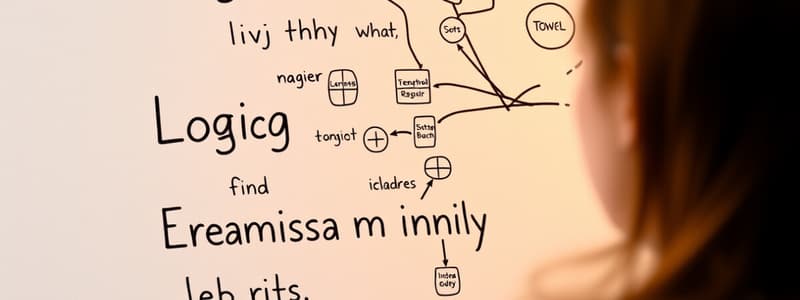Podcast
Questions and Answers
What is the definition of Logic?
What is the definition of Logic?
- Any statement that is either true or false.
- Reasoning with certainty from premises to conclusions.
- A statement that gives the meaning of the term.
- The science and art of reasoning well. (correct)
What does the law of excluded middle state?
What does the law of excluded middle state?
Any statement is either true or false.
What is the law of identity?
What is the law of identity?
If a statement is true, then it is true.
What is the law of noncontradiction?
What is the law of noncontradiction?
What is formal logic?
What is formal logic?
What is informal logic?
What is informal logic?
What is induction?
What is induction?
What is deduction?
What is deduction?
What is categorical logic?
What is categorical logic?
What is propositional logic?
What is propositional logic?
What is a term?
What is a term?
What is a definition?
What is a definition?
What are the 6 purposes of definitions?
What are the 6 purposes of definitions?
What is an ambiguous word?
What is an ambiguous word?
What is a lexical definition?
What is a lexical definition?
What is a vague word?
What is a vague word?
What is a precising definition?
What is a precising definition?
What is a stipulative definition?
What is a stipulative definition?
What is a theoretical definition?
What is a theoretical definition?
What is a persuasive definition?
What is a persuasive definition?
What is a genus?
What is a genus?
What is a species?
What is a species?
What does mutually exclusive mean?
What does mutually exclusive mean?
What does exhaustive mean?
What does exhaustive mean?
What are the 3 basic errors to avoid in genus-species charts?
What are the 3 basic errors to avoid in genus-species charts?
What is extension?
What is extension?
What is intension?
What is intension?
What are the 3 methods of defining terms?
What are the 3 methods of defining terms?
What does defining by synonym involve?
What does defining by synonym involve?
What does defining by example entail?
What does defining by example entail?
What does defining by genus and difference involve?
What does defining by genus and difference involve?
What are the 6 rules for defining by genus and difference?
What are the 6 rules for defining by genus and difference?
What is a statement in logic?
What is a statement in logic?
What are 3 types of sentences that are not statements?
What are 3 types of sentences that are not statements?
What are self-supporting statements?
What are self-supporting statements?
Flashcards are hidden until you start studying
Study Notes
Key Concepts in Logic
- Logic: The science and art of reasoning effectively.
- Law of Excluded Middle: A principle stating every statement is either true or false.
- Law of Identity: A concept where if a statement is true, it remains true.
- Law of Non-Contradiction: A statement cannot be both true and false simultaneously.
Types of Logic
- Formal Logic: Focuses on proper reasoning models and structures.
- Informal Logic: Addresses reasoning processes indirectly related to formal logic.
Reasoning Techniques
- Induction: Involves forming general rules based on specific examples or experiences.
- Deduction: Drawing definite conclusions from provided premises.
Branches of Logic
- Categorical Logic: Connects categories or terms through syllogisms.
- Propositional Logic: Analyzes the relationships between entire propositions within arguments.
Definitions and Terms
- Term: A clearly expressed concept.
- Definition: An explanation of the meaning of a term.
- Purposes of Definitions: Include showing relationships, removing ambiguity, clarifying vagueness, expanding vocabulary, explaining theoretical concepts, and influencing attitudes.
Ambiguity and Vagueness
- Ambiguous Word: A word with multiple meanings.
- Vague Word: A term with unclear boundaries.
- Precising Definition: Clarifies vague terms in specific contexts.
- Stipulative Definition: Provides a meaning for new or redefined terms.
Advanced Definitions
- Theoretical Definition: Explains technical or philosophical terms that lack understanding.
- Persuasive Definition: Aims to sway the listener's perspective toward a term.
Genus and Species
- Genus: A broader term that encompasses the original term.
- Species: A more specific term included within the broader original term.
- Mutually Exclusive: Terms that do not overlap.
- Exhaustive: Covers all possible categories without omissions.
Common Errors in Logic
- Genus-Species Charts: Avoid overlapping species, changing definitions, and using parts instead of kinds.
Extension and Intension
- Extension: The total of all individual objects described by a term.
- Intension: The set of common attributes associated with a term.
Methods of Defining Terms
- Defining by Synonym: Using another word with the same meaning, which can be problematic if synonyms are unknown.
- Defining by Example: Illustrating a term with specific instances, which may lead to ambiguity.
- Defining by Genus and Difference: Naming the genus and distinguishing features that set the term apart.
Rules for Genus and Difference
- Definitions should clearly express essential attributes, be non-circular, maintain appropriate breadth, avoid ambiguity, be positively stated, and match the term's part of speech.
Statements and Their Types
- Statement: A sentence that can be determined as true or false.
- Non-statement Types: Questions, commands, and nonsense sentences.
- Self-supporting Statements: Truth values ascertainable from the statement itself.
Studying That Suits You
Use AI to generate personalized quizzes and flashcards to suit your learning preferences.




